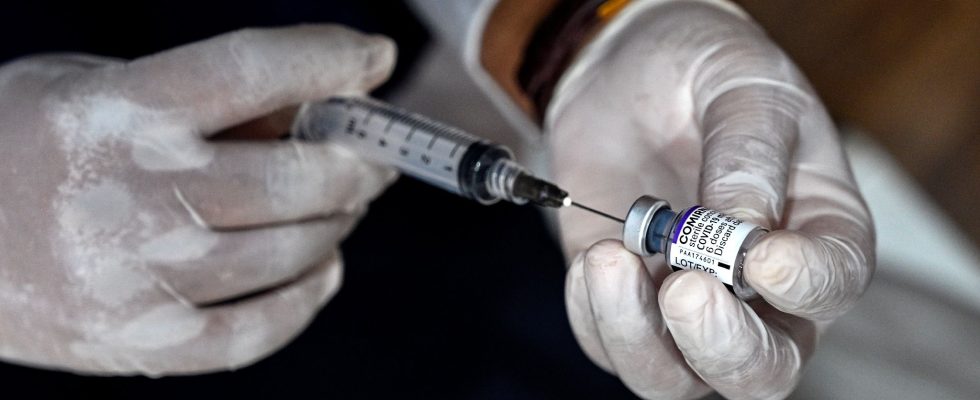New variants, increasing cases, a reminder often dating from last fall and the start of the new school year which is approaching, always conducive to an acceleration of the circulation of viruses… While many thought the pandemic was behind us, the Covid remembers our good memories. To the point that many seniors, more at risk of serious forms of the disease, are wondering about the advisability of revaccination now. “My pharmacist told me that my last reminder was more than six months ago, and that I would do well to do a new one very quickly”, testifies Pierre, a septuagenarian living in the East of France, a little lost between this advice and the official recommendations, which currently recommend revaccination from October 17, at the same time as the flu campaign.
In reality, as often with the Covid, the response could once again upset well-established forecasts and schedules. The experts are formal: despite the recent increase in cases, it is better to wait to receive a new injection. But, depending on the epidemic situation, it will not necessarily be necessary to wait until the middle of October: “The new vaccines adapted to the variants in circulation have been ordered. They are being manufactured and should be delivered in September. in France, which would allow, if necessary, to start the vaccination campaign against Covid upstream of that of the flu”, indicates to L’Express Pr Brigitte Autran, president of the Committee for monitoring and anticipating health risks (Covars), responsible for issuing advice to the government on these issues. For its part, the Pfizer laboratory has submitted an application for approval to the European Medicines Agency, and confirms that it is ready to send its doses to the Member States “as soon as regulatory approval is obtained”.
There are several reasons for advocating for the most impatient to wait for the arrival of these new injections. First of all, a recent study showed that an additional dose of the product used last fall – the one that is still currently in pharmacies – would be useless… “According to this work, a second injection of the bivalent vaccine from 2022 does not This is currently a preprint, which has not yet been peer reviewed, but its authors are known and serious, and we therefore have every reason to believe that their message is valid”, underlines Pr Autran.
Wait a bit to benefit from better protection this winter
On the contrary, the new vaccines seem much better able to protect us. They no longer contain the Spike protein of the original viral strain (the so-called Wuhan virus) but only that of the still dominant variant, XBB.1.5. “According to the first data, the volunteers who received this vaccine respond very well to this variant. And another preprint also shows that the emerging variant EG.5.1, also called Eris, would also be sensitive to vaccination against XBB.1.5”, continues Professor Autran.
Specialists also point to the small scale of the current epidemic recovery: “For the moment, there does not seem to be a strong increase in hospitalizations. Relaunching a campaign now would not be very mobilizing, and would create an excessive alert. Better worth doing it at a time when the population will be more receptive to it, rather than in the middle of August”, confirms Professor Alain Fischer, the former president of the Orientation Committee for the Vaccine Strategy, now dissolved. Waiting a little to receive a new injection will also allow you to benefit from better protection during the winter, when the epidemic will probably be more active, if we are to believe the experience of previous years.
“In general, it is preferable to stick to the opinions of the health authorities for these questions, because they are established by independent experts, based on all the scientific data available”, insists Pr Antoine Flahault, director of the Institute of Global Health, at the University of Geneva (Switzerland). When the green light is officially given, the target audiences will therefore have every interest in following the recommendations. “It is said that the variants currently in circulation are not more virulent than the previous ones. In reality, it would be more accurate to recall that they have not lost their aggressiveness, and that vaccination coverage protects us from this aggressiveness. its effectiveness decreases over time, hence the need for reminders”, underlines Professor Gilles Pialoux, head of the infectious and tropical diseases department at the Tenon hospital in Paris (AP-HP).
Will we one day be done with these repeated injections, whether against the flu or against covid? The protection conferred by vaccines is fraying over the months for two reasons: the steady decline in our antibody levels, and the evolution of the virus, which mutates to escape our defences. One avenue explored by scientists would be to develop a vaccine targeting the so-called conserved parts of the virus, those that do not mutate. The famous universal vaccine that researchers have already been trying to develop against the flu for several years. “It is a very complex task, but several manufacturers are in the race, and at least one clinical trial has already been launched in humans with a universal anti-covid vaccine. We are therefore hopeful that this work will be completed soon” , says Gilles Pialoux.
